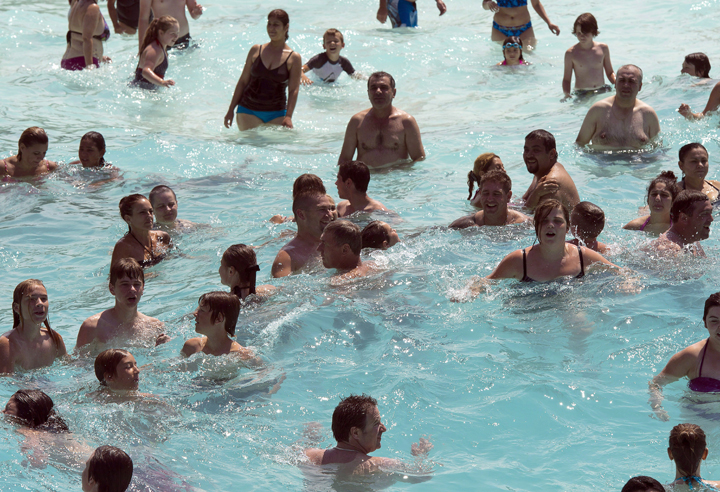City officials say they are ready for a potential heat wave in Montreal.

“We are on the potential cusp of a wave of extreme heat and we are ready to intervene if necessary,” said Montreal Mayor Valérie Plante.
Environment Canada issued a heat warning for the Greater Montreal area on Wednesday, noting that “maximum temperatures above 30 degrees Celsius are expected with humidex values between 35 degrees Celsius and 40 degrees Celsius through Friday.”
“As a result, conditions will feel particularly uncomfortable in these areas.
“During times of high heat, your health or your families and neighbours’ health can deteriorate rapidly,” Environment Canada said.
READ MORE: 66 Montrealers died from extreme heat during 2018 heat wave
Following the warning, Plante added that officials in both the boroughs and demerged cities are working together to ensure the proper measures are in place to check on residents and make sure everyone is taken care of.
The city said it is will extend hours for pools, libraries, community centres and homeless shelters if temperatures climb to dangerous levels.
Plante said workers will go door to door-to-check on people, hand out water bottles to the homeless and encourage citizens to stay cool and hydrated.
“The city’s Civil Security Center has a special plan to deal with the extreme heat in Montreal, which ties in with the measures implemented by the Public Health Department after the 2018 heat wave,” added Rosannie Filato, executive committee member for public security.
WATCH (July 2018): Death toll rises as Quebec heat wave continues

To date, the city’s extreme heat action plan has been implemented three times: during the summers of 2010, 2011 and 2018.
READ MORE: Deadly heat wave blamed for up to 70 deaths in Quebec

Get breaking National news
“This spring’s floods, our particularly difficult winter and last summer’s heat waves demonstrate the importance of reducing our vulnerability to extreme weather events,” said Laurence Lavigne Lalonde, who is responsible for ecological transition and resilience on the executive committee.
“The city intends to continue paying close attention to this new climate reality.”
According to the Montreal Urban Civil Protection Organization, an extreme heat scenario is declared when Environment Canada predicts the following:
- The maximum average temperature will be equal to or greater than 33 C for three consecutive days
- The minimum temperatures will be equal to or greater than 20 C
- The minimum temperature will reach or exceed 25 C for two consecutive nights
The 2018 heat wave was responsible for the deaths of 66 Montrealers, with more than half of those people living in the city’s heat islands — an area that is typically warmer than its surroundings due to human activity.
Long-term, Plante says the city has increased its budget to plant more trees to reduce this heat island effect.
WATCH (August 2018): Montreal’s hot July breaks 97-year-old heat record

According to the city’s Public Health Department, 80 per cent of those people died in their homes.
READ MORE: Montreal heat wave prompts more calls to Urgences-Santé
Among those who died, 72 per cent suffered from chronic diseases, 66 per cent were 65 years of age and over, 25 per cent had schizophrenic disorders and 18 per cent suffered from alcohol and addiction.
Signs of heatstroke and what to do
Early signs of heatstroke include fatigue, difficulty concentrating and dizziness.
Here are a few ways to avoid getting ill:
- Drink plenty of water, even before you feel thirsty
- Limit alcohol intake
- Stay in the shade when possible
- Cut back on activities that require effort
- Wear a hat and sunscreen
- Wear lightweight clothing, preferably made of cotton to allow for sweat evaporation
- Elderly people should avoid going out, especially if they are on medication
READ MORE: By 2100, 75% of the world’s population will face deadly heat waves
If you think you are suffering from a heat-related illness:
- Seek shelter or a cool place, rest and drink water
- If possible, use a fan to create air movement
- Use blinds or shades to filter direct sunlight
WATCH: How to protect your kids from the heat and other summertime health tips



Comments
Want to discuss? Please read our Commenting Policy first.